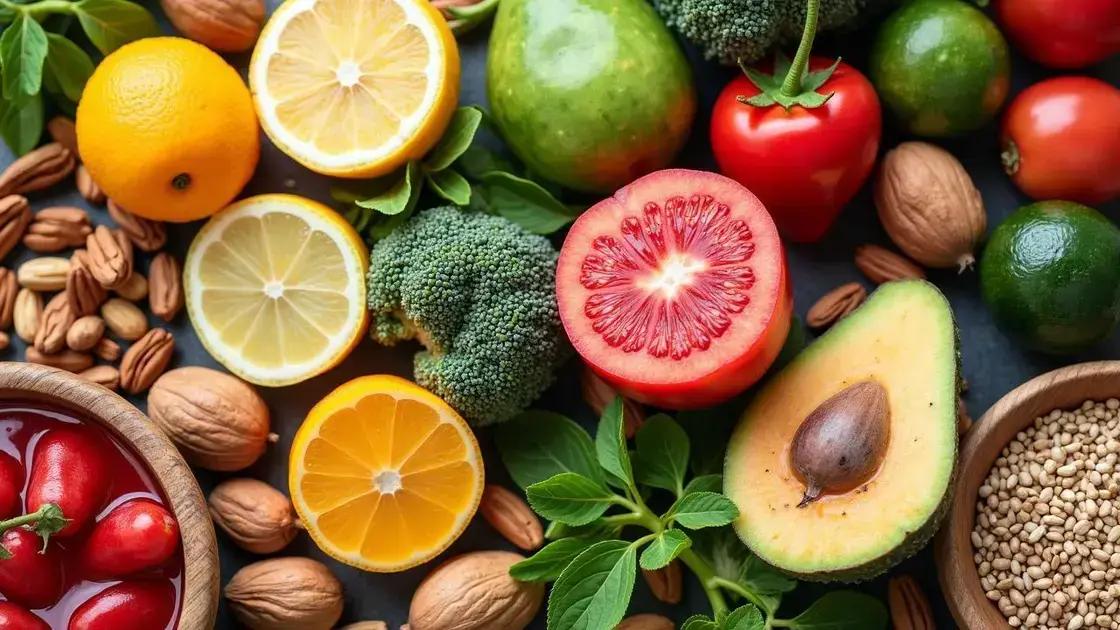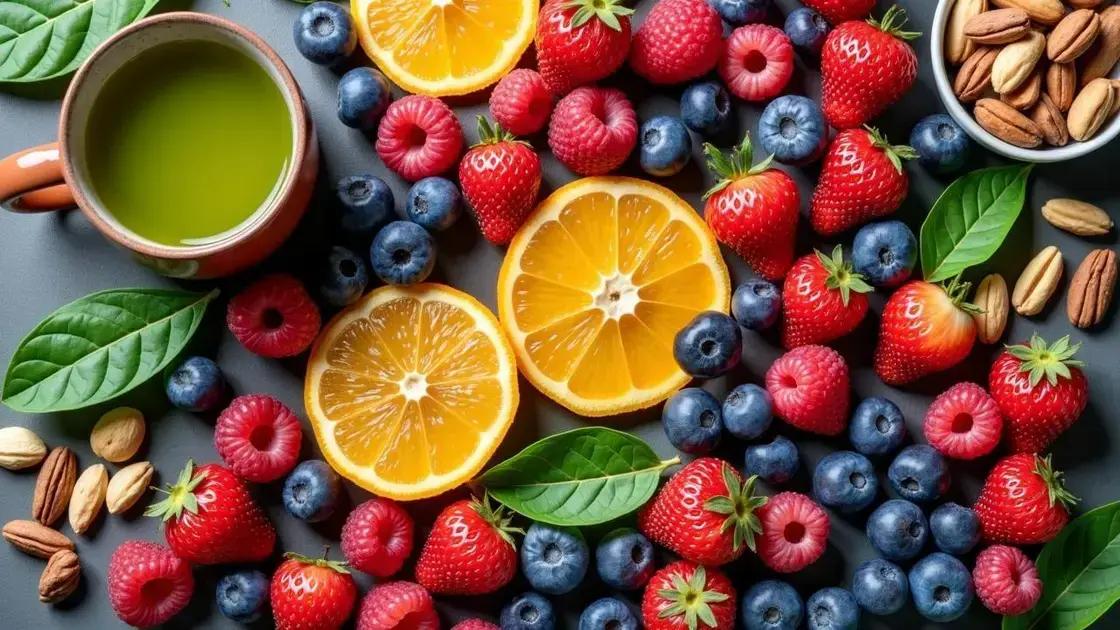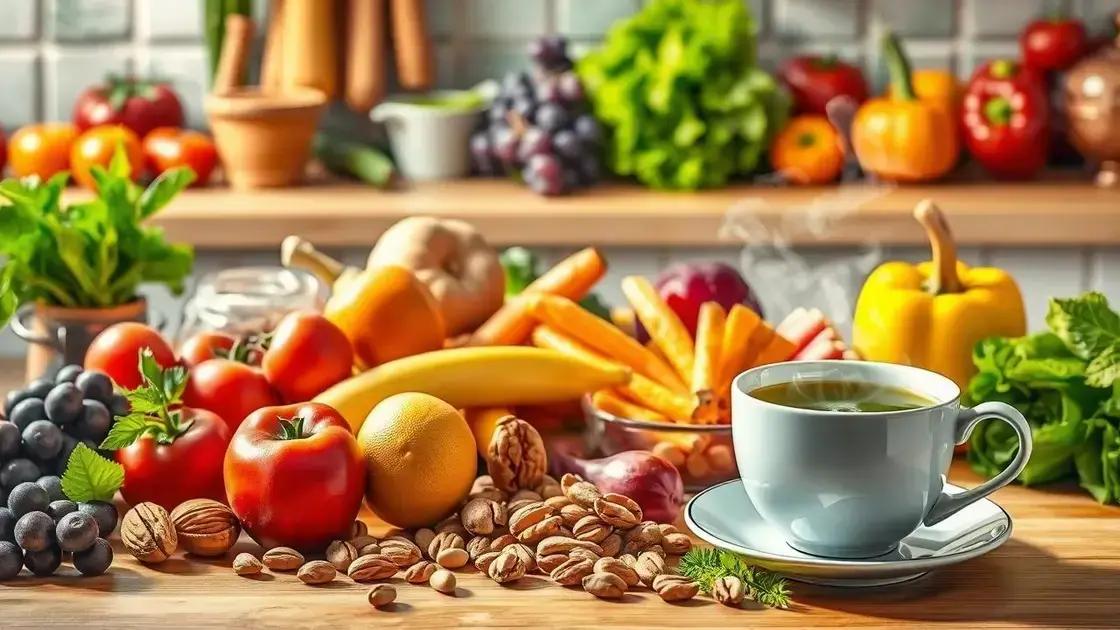Antioxidants are vital compounds that protect cells from damage caused by free radicals, playing a crucial role in healthy aging. They can be easily integrated into your diet through a variety of sources, such as fruits, vegetables, nuts, and whole grains, and offer numerous health benefits including improved skin health, cognitive function, and heart support.
As we journey through life, aging becomes a significant focus for many. One crucial element in ensuring a graceful transition into our later years is the role of antioxidants. These powerful compounds combat oxidative stress, a key player in the aging process. In this article, we will explore what antioxidants are, their essential benefits for aging, key sources, and how to effectively integrate them into your diet for a healthier, more vibrant life.
What Are Antioxidants?

Antioxidants are molecules that help protect our cells from damage caused by free radicals. Free radicals are unstable molecules that can harm cellular structures. They are produced during normal metabolic processes, environmental toxins, and radiation exposure. This cellular damage can lead to various health issues, including aging and chronic diseases.
Antioxidants neutralize these free radicals, thereby reducing oxidative stress. Several types of antioxidants exist, including vitamins, minerals, and phytochemicals. Some well-known antioxidants include Vitamin C, Vitamin E, selenium, and beta-carotene.
Common Types of Antioxidants
Vitamin C is essential for collagen production and can enhance skin appearance. It is mostly found in fruits like oranges, strawberries, and kiwi.
Vitamin E protects cell membranes and supports immune function, commonly obtained from nuts, seeds, and leafy greens.
Selenium is a trace mineral important for reproduction and thyroid health. It can be sourced from Brazil nuts, fish, and eggs.
Beta-carotene is a precursor to Vitamin A, promoting eye health and immune function. Foods rich in beta-carotene include carrots, sweet potatoes, and spinach.
How Antioxidants Work
Antioxidants work by donating an electron to free radicals, stabilizing them and preventing cellular damage. This mechanism is vital for maintaining cellular integrity and promoting overall health.
Incorporating antioxidants into your daily diet can not only protect your cells but also contribute to healthy aging. Understanding what they are and their roles sets the foundation for a lifestyle that promotes longevity.
The Benefits of Antioxidants for Aging

Antioxidants play a vital role in the aging process by offering numerous health benefits that help us maintain a youthful body and mind. One significant advantage is their ability to combat oxidative stress, which can lead to various age-related diseases. By neutralizing free radicals, antioxidants shield our cells from damage, supporting overall cellular health.
Enhanced Skin Health: Antioxidants are known for their ability to improve skin health. They protect skin cells from UV damage and environmental pollutants. Ingredients such as Vitamin C and E are popular in skincare products because they promote collagen production and reduce the appearance of wrinkles.
Improved Cognitive Function: Aging can lead to cognitive decline, but antioxidants may help protect brain health. Studies suggest that antioxidants like flavonoids, found in berries and green tea, can enhance memory and learning by reducing inflammation in the brain.
Support for Heart Health: Antioxidants contribute to cardiovascular health by preventing the oxidation of LDL (bad) cholesterol. Lower oxidative stress levels can reduce the risk of heart disease, making foods rich in antioxidants essential for a healthy heart as we age.
Boosted Immune System: The immune system tends to weaken as we age. Antioxidants like Vitamin C and zinc support immune function, helping our bodies fight off infections and illnesses more effectively.
Reduction of Inflammation: Chronic inflammation is linked to numerous age-related conditions, including arthritis and diabetes. Antioxidants possess anti-inflammatory properties that can help alleviate inflammation, promoting better health as we age.
Incorporating a diet rich in antioxidants is crucial for harnessing their benefits as we grow older. By prioritizing these compounds, we can enhance our quality of life and maintain our vitality for years to come.
Key Sources of Antioxidants

To reap the benefits of antioxidants, it is essential to know where to find them. There are numerous delicious and nutritious sources of these vital compounds. Incorporating a variety of antioxidant-rich foods into your diet can significantly contribute to healthy aging.
Fruits
Berries are among the richest sources of antioxidants. Blueberries, strawberries, raspberries, and blackberries are packed with anthocyanins that protect against cellular damage.
Citrus fruits like oranges, lemons, and grapefruits are high in Vitamin C, an important antioxidant that helps boost the immune system and skin health.
Vegetables
Leafy greens, such as spinach and kale, provide numerous vitamins and minerals while being high in antioxidants like beta-carotene and lutein, which support eye health.
Cruciferous vegetables including broccoli, Brussels sprouts, and cauliflower also deliver a variety of antioxidant compounds, promoting overall health.
Nuts and Seeds
Nuts such as walnuts and pecans contain healthy fats and are excellent sources of antioxidants, particularly vitamin E, which protects against oxidative stress.
Seeds, including sunflower seeds and chia seeds, are also rich in antioxidants and provide essential fatty acids that contribute to brain health.
Whole Grains and Beverages
Whole grains like oats, quinoa, and brown rice contain antioxidants alongside important nutrients that support heart health.
Green tea is well-known for its high levels of epigallocatechin gallate (EGCG), a powerful antioxidant that supports metabolism and overall health.
By including these foods in your meals, you can ensure a diverse intake of antioxidants that support healthy aging and enhance your overall well-being.
How to Integrate Antioxidants into Your Diet

Integrating antioxidants into your diet can be simple and enjoyable. Here are several effective strategies to boost your intake of these important compounds.
Add Fruits to Your Meals
Start your day with a healthy breakfast by including berries in your oatmeal or yogurt. Try adding sliced bananas or an apple to your cereal for added flavor and nutrients.
Snack on Nuts and Seeds
Choose nuts as a nutritious snack throughout the day. A handful of walnuts or almonds provides healthy fats and vital antioxidants. Seeds, like sunflower and chia seeds, can also enhance your snacks and salads.
Incorporate Colorful Vegetables
When planning meals, aim for a variety of colorful vegetables. Leafy greens, bell peppers, carrots, and sweet potatoes all offer different antioxidants. Include a salad with mixed greens, cherry tomatoes, and cucumbers for a nutritious side dish.
Drink Antioxidant-Rich Beverages
Substitute sugary drinks with green tea or herbal teas. Both are excellent sources of antioxidants. You can also try smoothies made with spinach, berries, and a banana for a refreshing and healthy drink.
Experiment with Spices
Enhance your cooking by adding spices like turmeric, ginger, and cinnamon. These spices not only add flavor but also deliver significant antioxidant benefits.
Try Whole Grains
Replace white bread and rice with whole grains like brown rice, quinoa, and whole grain bread. These options contain more nutrients and antioxidants that help maintain health.
By incorporating these simple changes into your daily routine, you can enjoy a delicious, antioxidant-rich diet that supports healthy aging.
Embracing Antioxidants for Healthy Aging
Incorporating antioxidants into your lifestyle is crucial for promoting healthy aging. These powerful compounds protect your body from oxidative stress, which is linked to a variety of age-related diseases.
By understanding what antioxidants are, recognizing their benefits, and knowing where to find them, you can effectively enhance your diet. Adding antioxidant-rich foods, such as fruits, vegetables, nuts, and whole grains, can significantly improve your overall health and well-being.
It is essential to adopt practical strategies for integrating these nutrients into your daily routine. From enjoying delicious snacks to experimenting with vibrant recipes, every little change contributes to a healthier, more vibrant life.
Ultimately, with a commitment to a diet rich in antioxidants, you can support not just your health but also your vitality as you age gracefully.
FAQ – Frequently Asked Questions about Antioxidants and Healthy Aging
What are antioxidants?
Antioxidants are molecules that protect your cells from damage caused by free radicals, promoting overall health and longevity.
What are the benefits of antioxidants for aging?
Antioxidants help combat oxidative stress, improve skin health, boost cognitive function, support heart health, and strengthen the immune system.
Where can I find antioxidants in my diet?
You can find antioxidants in a variety of foods, including berries, leafy greens, nuts, seeds, whole grains, and teas.
How can I easily incorporate antioxidants into my meals?
Add fruits to breakfast, snack on nuts, include colorful vegetables in meals, and choose whole grains instead of refined grains.
What role do spices play in antioxidant intake?
Spices like turmeric, ginger, and cinnamon not only add flavor to dishes but also provide significant antioxidant benefits.
Can a diet high in antioxidants improve my overall health?
Yes, a diet rich in antioxidants can improve your overall health, reduce the risk of chronic diseases, and promote healthy aging.













